#a conglomeration of marketable ideas
Explore tagged Tumblr posts
Text
I've been told my comic feels like it was written by AI.
I suppose I'm not trying to be groundbreaking. I'm not interested in pioneering genres. I'm not writing for the purpose of literary analysis.
But written by AI...?
I'm already someone who has my humanity questioned. My identity erased. My existence disrespected. It could be worse. Anything could be worse.
But AI?
I spend weeks writing single scenes, toiling over the implications of single lines. I have goals. My writing has intent.
If you cared to read deeper, perhaps you'd see the themes. Maybe then you'd see the value. If you tried to analyze it maybe you'd see something there.
Maybe you'd see me.
Someone told me my comic seemed like it was written by AI.
And my humanity was denied one step further in that my voice was not seen in the work I've poured years of my life into.
#this is a comment that has bothered me for... a long time.#it really sat with me.#its insulting of course...#but i get insults all the time#thats not what bothered me.#there was something more to it#something more to how this hurt my feelings and why it lingered so long in my mind#and i think its because of this.#it removes me. it removes my humanity.#in a world where i already feel so invisible and invalidated#where i express myself. my love. through my work#to be told it seems like something a literal robot coild make#a conglomeration of marketable ideas#god. jts so insulting on a completely other level.#its straight up dehumanizing#so. watch the things you say seem like ai#when its actually made by an artist#especially if you know that it was made bh someone#they have a heart an theyre trying to show it to you#i know its not that deep or whatever.#but isnt it?#isnt the point of our art to connect to others? to love them? to spend time with them??#im being dramatic#but i also care#and sometimes a little extra drama is what gets my ideas across.#i would know#im a writer
185 notes
·
View notes
Text
Denise Hearn and Vass Bednar’s “The Big Fix”
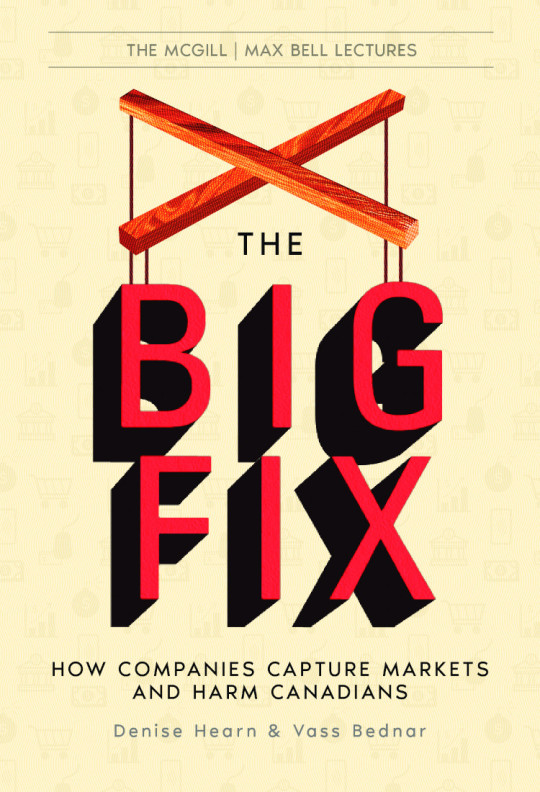
If you'd like an essay-formatted version of this post to read or share, here's a link to it on pluralistic.net, my surveillance-free, ad-free, tracker-free blog:
https://pluralistic.net/2024/12/05/ted-rogers-is-a-dope/#galen-weston-is-even-worse

The Canadian national identity involves a lot of sneering at the US, but when it comes to oligarchy, Canada makes America look positively amateurish.
If you'd like an essay-formatted version of this thread to read or share, here's a link to it on pluralistic.net, my surveillance-free, ad-free, tracker-free blog:
https://pluralistic.net/2024/12/05/ted-rogers-is-a-dope/#galen-weston-is-even-worse
Canada's monopolists may be big fish in a small pond, but holy moly are they big, compared to the size of that pond. In their new book, The Big Fix: How Companies Capture Markets and Harm Canadians, Denise Hearn and Vass Bednar lay bare the price-gouging, policy-corrupting ripoff machines that run the Great White North:
https://sutherlandhousebooks.com/product/the-big-fix/
From telecoms to groceries to pharmacies to the resource sector, Canada is a playground for a handful of supremely powerful men from dynastic families, who have bought their way to dominance, consuming small businesses by the hundreds and periodically merging with one another.
Hearn and Bednar tell this story and explain all the ways that Canadian firms use their market power to reduce quality, raise prices, abuse workers and starve suppliers, even as they capture the government and the regulators who are supposed to be overseeing them.
The odd thing is that Canada has been in the antitrust game for a long time: Canada passed its first antitrust law in 1889, a year before the USA got around to inaugurating its trustbusting era with the passage of the Sherman Act. But despite this early start, Canada's ultra-rich have successfully used the threat of American corporate juggernauts to defend the idea of Made-in-Canada monopolies, as homegrown King Kongs that will keep the nation safe from Yankee Godzillas.
Canada's Competition Bureau is underfunded and underpowered. In its entire history, the agency has never prevented a merger – not even once. This set the stage for Canada's dominant businesses to become many-tentacled conglomerates, like Canadian Tire, which owns Mark's Work Warehouse, Helly Hansen, SportChek, Nevada Bob's Golf, The Fitness Source, Party City, and, of course, a bank.
A surprising number of Canadian conglomerates end up turning into banks: Loblaw has a bank. So does Rogers. Why do these corrupt, price-gouging companies all go into "financial services?" As Hearn and Bednar explain, owning a bank is the key to financialization, with the company's finances disappearing into a black box that absorbs taxation attempts and liabilities like a black hole eating a solar system.
Of course, the neat packaging up of vast swathes of Canada's economy into these financialized and inscrutable mega-firms makes them awfully convenient acquisition targets for US and offshore private equity firms. When the Competition Bureau (inevitably) fails to block those acquisitions, whole chunks of the Canadian economy disappear into foreign hands.
This is a short book, but it's packed with a lot of easily digested detail about how these scams work: how monopolies use cross-subsidies (when one profitable business is used to prop up an unprofitable business in order to kill potential competitors) and market power to rip Canadians off and screw workers.
But the title of the book is The Big Fix, so it's not all doom and gloom. Hearn and Bednar note that Canadians and their elected reps are getting sick of this shit, and a bill to substantially beefed up Canadian competition law passed Parliament unanimously last year.
This is part of a wave of antitrust fever that's sweeping the world's governments, notably the US under Biden, where antitrust enforcers did more in the past four years than their predecessors accomplished over the previous 40 years.
Hearn and Bednar propose a follow-on agenda for Canadian lawmakers and bureaucrats: they call for a "whole of government" approach to dismantling Canada's monopolies, whereby each ministry would be charged with combing through its enabling legislation to find latent powers that could be mobilized against monopolies, and then using those powers.
The authors freely admit that this is an American import, modeled on Biden's July 2021 Executive Order on monopolies, which set out 72 action items for different parts of the administration, virtually all of which were accomplished:
https://www.eff.org/deeplinks/2021/08/party-its-1979-og-antitrust-back-baby
What the authors don't mention is that this plan was actually cooked up by a Canadian: Columbia law professor Tim Wu, who served in the White House as Biden's tech antitrust czar, and who grew up in Toronto (we've known each other since elementary school!).
Wu's plan has been field tested. It worked. It was exciting and effective. There's something weirdly fitting about finding the answer to Canada's monopoly problems coming from America, but only because a Canadian had to go there to find a receptive audience for it.
The Big Fix is a fantastic primer on the uniquely Canadian monopoly problem, a fast read that transcends being a mere economics primer or history lesson. It's a book that will fire you up, make you angry, make you determined, and explain what comes next.
160 notes
·
View notes
Text
Imagine Pope telling Benny you've gone missing while on a stakeout

"Come on man, why all the cloak and dagger?" Benny jibed, "you're going to have to tell us why we're here anyway. Why did we have to follow some ridiculous instructions to get here."
"'cause we're all probably being watched, I couldn't risk anything else going wrong with this mission."
"What do you mean?" Frankie questioned. The atmosphere suddenly got very thick and uneasy.
"I um, so-" Santiago paused, unsure of how to start.
"Spit it out Pope." Tom jumped in.
"Okay, so you know I mentioned the set timings they brought people in, under the cover of night so they had more privacy?" the silence continued, "so with them knowing who I am. I needed to bring in a face they wouldn't bat an eyelid at..."
All four men wore heavy set expressions, cogs turning in their minds at where Santiago was going with this. Benny shared a look with his brother. Not liking where this was going.
"So I called in some help. Just know I didn't force this okay. I asked for a favour."
"Christ man. Spit it out." Will snapped. Not liking how sheepish Santiago was acting.
"It's Y/N. Okay she was doing some night recon for me and two days ago she went radio silent. And we had a strict agreement to check in once every 24 hours. So I knew she was okay." Santiago blurted out.
"Are you fucking kidding?" Benny asked, not sure how to take the news.
"I can't tell you how much I wish I was Ben. I'm sorry."
All five men had a soft spot for you. Having known you for a number of years. Friendships had developed across continents with them. They all cared about your safety as they did each other. Spending time both on the battlefield and at home. You'd even moved cities to be closer to the group. Since then spending a huge chunk of your time with the Miller brothers. Well. One to be particular. Benny and you had a different kind of relationship. One that had never progressed from the gooey eyed longing looks at one another from across the pool table. Among every other place you guys hung out. You supported him ringside at every match. Cheering him on and giving him the push to fight just that little bit harder. Earning you the title of good luck charm after Bennys fourth win in a row once you started coming along.
Saying that you had a special place with all of the guys. You were a constant with Frankies family. Supporting his wife while Frankie had his drug charges cleared up.
You even introduced Will to his fiancée.
Tom had listened to your advice on how he would be able to start repairing his relationship with his daughter. Resulting in them going on their first dad-daughter camping weekend.
Pope had always been a bit of an enigma with the group. But you too had a special place with him. You helped him hash out many a crazy idea. Toning them down when he got too into the idea of taking down huge conglomerates widely known to be untouchable.
"Fuck. Where was she last supposed to reach you?" Benny asked, leaning forward in his seat.
"She always called my phone from a payphone just outside the market. At two o'clock. But that last two days I've heard nothing."
"Where was she staying?"
"At a hotel on the outskirts of town, room 203. Self catering kind of deal."
"Right, Fish and Will. Go to that payphone and see if there's any sign there. I'm going to stay put see if she turns up here. Benny-"
"Go to the hotel. Got it."
The boys sprung into motion. Grabbing what they needed and heading for the truck they arrived in.
"Benny, I'll drop you off at the hotel." Santiago offered, earning a nod from Ben.
He followed closely behind Santiago. Still on the fence about whether he should give him an earful in the car of the way.
"She better be alright."
"I know. You're gonna kick my ass if she isn't."
"Damn right. But I know you didn't do this on purpose."
The ride was pretty quiet from then on. Both men itching to get to the hotel to confirm their hopes.
Benny couldn't help but scan everyone's face as they passed. Hoping she would just appear on a street corner unharmed.
Pulling up in the car park to the hotel. Benny was out the door even before Santiago could turn off the engine. Scanning the room numbers he headed for the stairs. Taking them two at a time, he followed the descending numbers. 213, 212, 211... Round the corner to the side of the block. He continued, 206, 205, 204... Pausing as he locked eyes on 203. Bracing himself for the worst he reached to twist the door handle, light pressure made the already opened door swing fully open.
Letting out a quiet whistle. Signalling to Santiago, Benny reached for the pistol he had stashed in the back of his trousers. With the curtains pulled the room was dim, when he didn't immediately spot you his guard remained on high alert. The room didn't look trashed. But it didn't exactly look neat and tidy. There was some semblance of disarray.
Benny recognised your belongings though. The notebook you always scribbled in. The snacks you never went anywhere without. He even recognised one of his boxing sweatshirts in the messy bed.
Relaxing his stance, Santiago took over scanning the rest of the room. Benny looked through the ripped up paperwork on the bed, seeing you'd made notes about the targets for him. Santi headed for the bathroom, to cover all bases.
"Benny get in here now!" Santiagos voice jolted Benny out of his thoughts.
Preparing himself to see something he didn't want to, he practically ran into the bathroom. Almost tripping over a crouching Santi. Who was hovering over your unconscious figure slumped in between the wall and the toilet bowl.
159 notes
·
View notes
Note
why do you continue to watch gmmtv shows when you clearly don’t enjoy them?
This is the kind of rude, cowardly anonymous ask that I would typically just delete, but I’m in the mood to be generous so I will respond and use it as an educational moment.
I have to start by rejecting your premise. I enjoy plenty of GMMTV shows. My favorite Thai bl of this year is Cherry Magic Thailand. I wrote quite lovingly about it on this hellsite for 12 weeks. I was also a big fan of Cooking Crush and The Trainee this year, Kidnap is giving me joy weekly, and I’m currently in the midst of a really interesting discussion with people far more mature than you about Peaceful Property. GMMTV is also responsible for some of my all time favorite Thai shows including Bad Buddy, 3 Will Be Free, Midnight Museum, Theory of Love, Moonlight Chicken, and Dark Blue Kiss, and many more besides that I liked a lot. You don't know me. You have made the mistake of assuming that because you’ve seen a small fraction of my posts about specific things, you know what I think about all kinds of things. But as my beloved departed grandfather loved to say, when you assume you make an ass out of u and me.
So with that out of the way, let’s get to the real question underneath your logical fallacy: why don’t I keep my mouth shut instead of posting about the flaws I observe in these shows? There are a number of reasons for that.
First, I am extremely open about the fact that I am interested in the art and science of narrative storytelling, and I often post about it from a critical lens. This is all in the pinned post at the top of my blog, but I doubt someone with your lack of manners bothered to look there before sending me this ask.
Second, I don’t believe in the popular fandom idea that all meta discussion of shows should be positive and centered on stanning for actors or pairs and their shows. That's a fine pursuit for folks who enjoy engaging with media that way, but I personally find that boring and intellectually empty, and have very little interest in it. I like to learn from the things I enjoy, and you can't learn if you're not willing to think critically about why something in a story may or may not be working.
Third, my favorite thing about watching media is discussing it with like-minded people, and the way to find like-minded people is to share your honest feelings about what you're watching. I have made some of the best friends of my life by posting my unfiltered thoughts about whatever I'm watching in various social media spaces, and having people come and say "hey, me too" or "I don't quite agree but what an interesting thought." We connect with others through sharing our thoughts and feelings. If you censor yourself in fandom spaces, you will not find your people.
Fourth, on the specific topic of GMMTV: they are the largest and best resourced ql-producing studio in the biggest ql-producing country, and part of a giant media conglomerate that controls much of the media in Thailand. Their shows matter in terms of the influence they have over the rest of the industry, and so the messages they send with their shows also matter. I will never ignore them completely even when I choose not to watch some of their shows, because where they go, the larger ql industry follows. When I see a trend in their shows that is harmful, like, say, the repeated use of marginalized identities for marketing their shows that they then disrespect in the way the stories are executed, that needs to be pointed out and examined, and I am hardly the only one doing so.
I'll end by asking you a question, anon: what did you hope to accomplish by sending me this ask? Unlike many of the other folks who have been engaging in critical discussion with me over the last couple days, you had nothing constructive to say. You didn't put forward an interpretation or share your own feelings, you didn't contribute to the collective analysis process, and you didn't offer any commiseration or even a clear disagreement with anything I said. From where I'm sitting, your only intent was to attempt to shame me for speaking. You will never be successful at that, and it's a pretty ugly impulse that you should examine in yourself. When you find yourself being awful to real human beings because you can't manage your emotions about fictional media, it's time to think about what you're doing here. I hope you'll reflect on that, and take good care.
78 notes
·
View notes
Note
So I noticed something interesting linguistically during my Spanish lessons but then I couldn't find a reason why and thought maybe you would have an idea?
Why does the word 'German' change so much from language to language? I mean you said Deutsch but we say German. But then in Spanish, it's Alemán. That's a massive change across three language. And I know they're from different language families but it still seems like a big change, I wonder why
I mean...yeah, it's kind of a situation
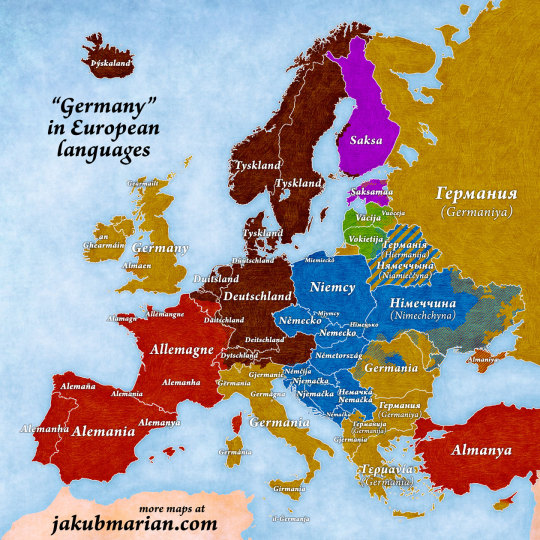


The thing is, Germany was only united as a single country in 1871. Before that, it was really a conglomerate of many different small cities, dukedoms, and kingdoms under the Holy Roman Empire (and before that: Tribes)
Modern-day Germany was just beyond the edge of civilisation during ancient times - Everything to the west and South, including France and England, was conquered and named and cartographed by the Romans but Germania was what was on the "other side":
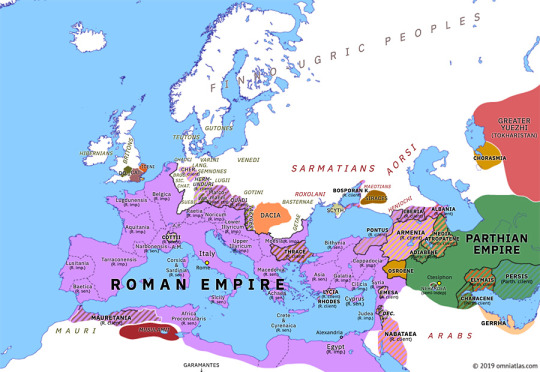

The beige part was where civilisation ended for the Romans. Everything beyond the Limes was barbarian woods and most attempts to conquer there ended in military disasters like the battle of the Teuteburger Forest so ...not much progress was being made.
The name "Germania", that was used for EVERYTHING beyond the Limes border was apparently adopted from the word the Gauls used for the peoples they knew were living right there on the other side - and which meant something like "people of the forest" or possibly "neighbours" (which means the Romans might have done that ancient thing where they asked the Gauls: "Who lives over there?" and the Gauls were "Oh, yeah, those guys are our neighbours who sometimes come to our markets and that we fight with sometimes and who talk a little weird" and the Romans were like: "Ah, so the name of everyone living in the great beyond is 'Neighbours' and just stamped that name on a large chunk of the continent full of people who had never met a Gaul and had never heard of the word "Germania")
And because that area wasn't centralised the way the former colonies of Rome were, this pattern continued - when "states" (there was no modern-day statehood then, I guess the closest word would be "Reiche" but that would be Empires in English but that also doesn't describe it accurately and Reich has a Connotation in English and kingdom suggests a kind of continuity that didn't exist yet...) interacted with the people who lived in these lands, they often falsely assumed a level of social cohesion that didn't exist. One example is when Charlemagne pushed East, he would often make deals with the pagan Saxon tribes to please stop raiding all the nice monasteries he tried to establish - but it happened again and again, and people at the time concluded that the Saxons simply didn't honour their word. The problem was, that the Saxons were not united under one ruler and were not one cohesive tribe - so just because one of them made a deal to stop raiding monasteries, this doesn't mean anyone else got the memo or felt obliged to stop plundering those monks.
Even today, this kind of happens: Like "teutonic" being used for "german" because Teutons were a German tribe or people identifying Germany with Bavaria bc they hear a lot about the Oktoberfest or "Prussian" and "German" being equated because between 1871 and 1918, the Hohenzollern, being both the royal House of Prussia and the Kaiserhaus, largely dictated Germany's foreign policy and impression to the rest of the world, and even before that posing the biggest counter-weight to the Austrian/Austro-Bavarian role on the German-speaking playing field and often symbolising the different cultures (e.g. protestant vs catholic) existing across the German-countries-minus-Switzerland.
And this is also how the name thing happened: "Deutsch" just means "of the people" and was largely used for the language (hence "Dutch", being a very similar language to German, also having that very similar name, except, since they were the "Low Countries" (flat as a pancake land) of the Holy Roman Empire, they eventually took that name for themselves and their language when they became independent - the Netherlands speaking nederlands, while Belgish dutch-speakers speak "vlaams" after the region "Flanders") But since Germany never "separated" from the Holy Roman Empire but is largely considered its successor, there was no reason to make a regional name the name for a new nation. It just remained "the nation/the people".
Over the centuries, the other countries usually took whatever name there was for the regional tribe of Deutsche/people they dealt with and applied that to the whole thing: If you dealt primarily with the Alemanni people, you would use a word like the French "Allemagne", the English lived on an island and mostly kept using the Latin name "Germania" - which became "Germany". In Finland and Estonia it's "Saksa" and "Saksamaa" because being in the East, they mostly dealt with Saxons.
This also turned into an international game of telephone eventually: People who didn't have much contact with different kinds of Europeans would just pick up whatever name the people they dealt with used for Germany. If you had a lot of contact with the French or Spanish, you would pick up a variation of "Alman", if you dealt primarily with the English or Italians, it would be a variety of "Germania"
Then you have countries like Japan, which entered international exchange very late and had a lot of contact with Dutch and German speakers - which is why they say ドイツ - "doitsu". In Mandarin it's "Déguó" - guó meaning "land" and "Dé" for Deutschland.
Then there is also the language barrier: The modern nation-states of Germany and Italy both were once part of the Holy Roman Empire and neither had a standardised language (even today, on the European continent, Germany and Italy might take the prize for the most variations of their own language on the home continent) or considered themselves "German" or "Italian" until very late. So they distinguished between the people who spoke all the variations of their own language and those people above/below the Alps who were absolutely incomprehensible to them due to speaking an entirely different language family - so the Italians also spoke of "tedesco", which is related to the word "deutsch". (Italy cleverly spared itself most of this chaos by not having a lot of neighbours to begin with).
Another language barrier issue was in the East, because that's where Germanic languages and Slavic languages meet. This meant that while everyone who was part of the German(ic) dialect family could communicate with their neighbouring towns and tribes and everyone on the Slavic side could communicate with their neighbouring towns and tribes, they were also faced with those weirdos from the other side of the language barrier who were speaking absolute gibberish (or maybe just stared at you like an idiot and said nothing when you asked them a basic question) That's why in many Slavic languages, the name for "Germany" is a variation of "Niemcy" or "Německo" - which means "mute" or "non-speaker" or "foreigner" - because those were the people they couldn't talk to. Vācija, Vokietija, and Vuoceja also work this way)
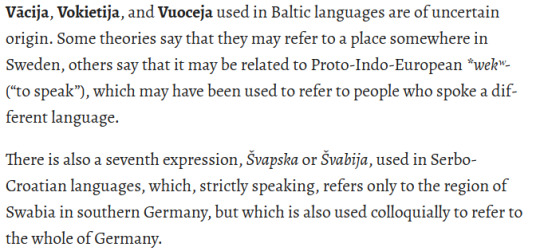
Meanwhile, in Germanic languages, it's often names that also incorporate the word "deutsch & land"- Duitsland, Tyskland, Deytshland, Däitschland, Þýskaland etc
(I think to do the language diversity and mutual communication argument some justice, I think it's also important to point out that there wasn't a lot of personal mobility for the average person at the time, so they probably also identified themselves by what little they saw of the world. If even today there are German-speakers that don't understand each other, that issue was bound to be amplified by 1000000 at a time with no standardised writing, no mobility, a thin population, small towns etc. So even if everyone between the furthest North-East of the Germanic language continuum and the lowest South-West could maybe somehow communicate with their respective neighbouring towns and tribes in pre-nation times, if you had snatched two peasants from the respective ends even of what is today Germany and sat them down on the table in the middle, there probably would have been to have even the most basic conversation or know that the other person spoke a variation of the same language - there is an old saying that "a language is a dialect with an army" - and for German, it's more "a dialect-continuum with a bunch of armies fighting each other until eventually, they got 1 army 2000 years late". Meanwhile for the educated, the lingua franca at the time was Latin.)
Now, a lot of countries ...well, eventually became countries. Which meant they could do some marketing of their own and establish their own name for themselves - but Germany, as I mentioned, was only united in 1871. Even if they considered their language "deutsch", they didn't consider themselves "deutsch" for a long time (and when they did, it was considered a radical idea) and as such, there was no centralised government saying "We are deutsch" the way the French kings said "We are French" or the English kings said "We are English" - in fact, the central authority until the early 19th century was the Holy Roman Empire. Their rulers considered themselves the successors of the old Roman Emperors - this was called the "translatio imperii" according to which Charlemagne was the first "new" Emperor" and the Empire continued until Franz II was forced to abdicate bc of Napoleon. Eventually, it was officially considered "Das heilige römische Reich deutscher Nation" - "the holy roman Empire of the german nation" - but that wasn't really a central aspect of anyone's identity.
The average person just identified by whatever colour their personal patch on this map was:


#InOurFlickenteppichEra
So no one really challenged to disagreed with someone speaking of them as "Saksa" or "German" and that's pretty much why everyone has a different name for Germany.
340 notes
·
View notes
Text
Love Lesson || Bucky Barnes (One-Shot)
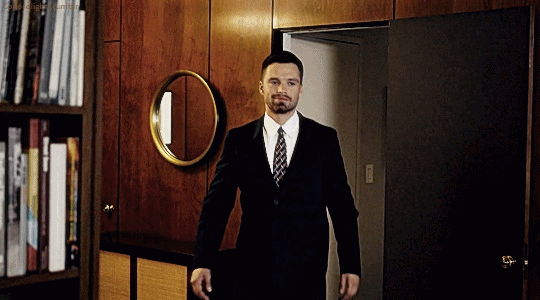
Character : College!Bucky x College!Reader
Words Count: 2,265
Summary: Y/N's academic challenges lead to an unexpected romance, changing her life and future in surprising ways.
Theme: Fluff
Main Masterlist || support: Ko-fi
Thank you to anyone who gave a like, reblog, and left a comment. It motivated me to write more.

Y/N and her friends were gathered at their favorite campus cafe, sipping on their lattes and chatting about the usual topics. Y/N was known among her friends for her beauty, and it wasn't uncommon for her to receive love confessions from various admirers.
Today was no exception. A fellow student approached her with a bashful smile and a heartfelt confession of admiration.
The admirer said, "Y/N, you're so amazing. I've had feelings for you for a long time. Will you be my girlfriend?"
Y/N, known for her kind and polite nature, smiled and thanked the admirer for their confession before asking a rather unconventional question, "What's your grade score in this semester's exams?"
Taken aback by the unexpected question, the admirer stammered, "Well, I'm not really into academics, but I'm great at other things."
Y/N's smile remained, but her response was clear, "I appreciate your feelings, but I'm looking for someone who's serious about their studies. I've had my share of handsome bad boys, and now I want someone smart and dedicated."
Her friends, who had witnessed this scene many times before, chuckled at Y/N's criteria for a potential partner. Y/N had outgrown the allure of handsome troublemakers and was seeking a different kind of connection, one that revolved around intelligence and academic ambition.
They couldn't help but playfully tease Y/N about the idea of her being with Bucky the famous campus nerd.
Emily: "Hey, Y/N, have you seen Bucky Barnes? He's like the campus nerd. Imagine dating him!"
Y/N, not thrilled with the idea, shrugged off the suggestion, "Come on, Bucky's way too quiet for me. I prefer someone more outgoing."
Steve and Sam, friends of Bucky, overheard the teasing from Y/N's friends about the possibility of Y/N being with Bucky. They couldn't resist sharing the humorous comments with Bucky.
Steve, with a grin: "Hey, Bucky, you won't believe what we heard. Y/N's friends were joking about her dating you, the campus nerd."
Bucky, who had always been reserved, smiled at the jesting comments. He didn't take them too seriously but was curious about this Y/N whom he had only heard of in passing.
Bucky Barnes was well-known on campus, primarily for his remarkable intellect and dedication to his studies. He was often referred to as the "campus nerd" by his peers, particularly in his computer science class.
Despite his nerdy reputation, Bucky was a kind and genuine individual. Whenever his classmates ask for help, Bucky will help them.
**********
Y/N was in her dorm room, trying to enjoy a rare moment of relaxation when her phone rang. She saw her grandmother's name on the caller ID and answered with trepidation.
Y/N: "Hello, Grandma."
Mrs. Johnson, her voice dripping with frustration, responded, "Y/N, I just saw your latest report card, and I am absolutely furious! Your grades are abysmal, and I won't stand for this any longer!"
Y/N, attempting to lighten the mood, quipped, "Well, Grandma, at least I'm not the one making the family fortune disappear in the stock market, right?"
Mrs. Johnson, not one to back down, retorted, "Touché, my dear. But we're talking about your future here! If your grade getting worse I will cut your allowance!"
Y/N, now feeling the pressure, replied, "I understand, Grandma. I'll make studying my top priority from now on, and I promise not to invest in any more 'get-rich-quick' schemes."
The call from her angry grandmother served as a wake-up call for Y/N. Y/N's grandmother, the famous CEO, had always been a beacon of intelligence and success.
Johnson Corporation is a well-established and highly successful conglomerate that operates in various sectors, including technology, finance, and real estate. Under the leadership of Mrs. Johnson, the company has grown to become a major player in the global business landscape. Known for its innovative solutions and strategic investments, the corporation is renowned for its commitment to excellence and its dedication to pushing the boundaries of industry standards. It stands as a testament to the Johnson family's legacy of business acumen and leadership.
However, it seemed that this remarkable intelligence had skipped a generation or two. Y/N's father had chosen a carefree lifestyle of constant travel with her mother, making every day feel like a honeymoon. They prioritized adventure and leisure over academia.
On the other hand, Y/N, despite her family's legacy, found herself grappling with math and her academic performance. Her struggles with the subject only added to her frustration, as she tried to live up to her grandmother's expectations and overcome the academic challenges she faced.
Mrs. Johnson hopes that Y/N will embrace her family's legacy and take on the responsibility of continuing the hard work and success that she has built. She desires to see a positive change in Y/N to ensure the family's bloodline carries on the business legacy.
As Y/N pondered how to resolve her academic issues, she found herself in a conversation with her lecturer one day. Little did she know that this conversation would introduce her to someone who would change her life.
Lecturer: "Y/N, I've noticed you're struggling with your grades. I'd like to introduce you to someone who might be able to help. This is Bucky Barnes, one of our top students. He's known for his dedication to academics."
Y/N, taken aback by the introduction, looked at Bucky, who was standing there with his kind but studious expression. She couldn't help but feel a spark of curiosity.
Bucky, shifting nervously, managed a small smile and said, "Hi there, I'm Bucky Barnes. I'm not as interesting as my physics textbooks, but I promise I'm helpful with those."
Y/N, charmed by Bucky's humility and humor, couldn't help but chuckle, "Well, Bucky, I'm Y/N, and I promise not to make you as bored as a physics lecture."
Their lighthearted exchange during their first meeting set the stage for their unique connection, blending Y/N's outgoing nature with Bucky's shy, endearing personality.
Y/N and Bucky had started their regular study sessions in the campus library, with books and laptops spread across the table. Y/N, dressed in her stylish, confident manner, was determined to improve her grades, while Bucky, the campus nerd, was there to assist her.
Y/N would occasionally struggle with the material, but Bucky's patient explanations and tutoring skills made it easier for her to grasp complex concepts.
Bucky's friends, Steve and Sam, sat with him in the campus courtyard, discussing his recent interactions with Y/N.
Steve: "So, Bucky, we heard you've been spending a lot of time with Y/N lately. What's going on there?"
Bucky: "Well, I'm tutoring her, you know, helping her with her grades."
Sam, with a teasing grin, chimed in, "Tutoring? Is that what they call it these days?"
Bucky: "No, really, it's just tutoring. She was struggling, and I offered to help."
Steve: "Come on, Bucky, we know you're a brainiac, but hanging out with Y/N? It's hard to believe."
Bucky, feeling a bit defensive, said, "She's actually really cool once you get to know her. We're just friends."
Sam, raising an eyebrow, added, "Friends, huh? Well, if you say so."
Bucky chuckled seeing his friend's reaction. Y/N actually were cool. But he has to admit her understanding of mathematics needs help.
Bucky encourages Y/N to work on an exercise without directly revealing that it's challenging, with the intention of helping her improve her grades and spend more time with her.
Bucky: "Y/N, I've come across an exercise that I think could be really beneficial for your studies. Working on this will help you make great progress."
Y/N, eager to improve her academic performance, took Bucky's suggestion seriously and worked diligently on the exercise.
***********
Y/N and Bucky were sitting in the campus library, their study materials spread out in front of them. The atmosphere was relaxed as they exchanged notes and discussed their coursework. Suddenly, Y/N dropped the bombshell:
Y/N: "Oh, by the way, Bucky, my grandmother wants to meet you."
Bucky's eyes widened in shock, almost dropping his pen.
Bucky: "Wait, what? Your grandmother? You mean, like, your incredibly successful and impressive grandmother wants to meet me?"
Y/N couldn't help but giggle at Bucky's flustered reaction.
Y/N: "Yep, that's exactly it. She's quite impressed with how you've been helping me improve my grades, and she's curious to meet you."
Bucky, still slightly overwhelmed, stammered, "I...I don't know what to say. I mean, that's...that's quite a surprise."
Y/N reassured him with a warm smile, "You don't have to worry, Bucky. Just be yourself.
Bucky felt nervous but excited since he had always regarded Y/N's grandmother as an accomplished and inspiring figure. The prospect of meeting his idol made him understandably nervous.
On the night of the dinner, Bucky arrived at Mrs. Johnson's elegant residence with Y/N, feeling a mix of excitement and anxiety. He knew this was a significant moment and hoped to make a good impression on the successful businesswoman who had also become Y/N's role model.
During a family dinner, Y/N's grandmother, Mrs. Johnson, couldn't help but notice the bond between Y/N and Bucky.
Mrs. Johnson: "You know, Y/N, Bucky here is quite the intelligent young man. It would be nice to have a smart son-in-law, don't you think?"
Y/N turned beet red with embarrassment, stuttering, "Grandma, it's not like that!"
Bucky, who had taken the comment seriously, smiled and said, "Well, Mrs. Johnson, I'll do my best to live up to your expectations."
******
As Y/N and Bucky's friendship blossomed, an unexpected turn of events shook their world. Y/N received news that her grandmother, the successful CEO of Johnson Corporation, had suddenly fallen seriously ill. Mrs. Johnson, aware of her condition, appointed Y/N as the temporary director of the company. This decision was based not only on family ties but also on Y/N's substantial ownership of the company's shares.
Y/N was faced with the daunting responsibility of managing the family business during her grandmother's illness.
Y/N had been thrust into the role of temporary director of her family's company, and the pressure was beginning to weigh on her. She felt overwhelmed and scared by the responsibilities that came with the position.
Y/N, her voice trembling with anxiety, turned to Bucky:
Y/N: "Bucky, I'm really scared. I don't know if I can handle all of this. My grandmother has put so much trust in me, and I don't want to let her down."
Bucky, ever the supportive friend, reached out and gently placed his hand on Y/N's.
Bucky: "Y/N, I know this is a lot to take on, but you're stronger than you realize. You've got an incredible work ethic and a smart mind. You can do this. And I'll be right here beside you, helping you every step of the way."
Y/N looked into Bucky's eyes, finding solace in his words and his unwavering support. His reassurance gave her the confidence to face the challenges ahead.
As Y/N and Bucky navigated the challenges of managing the family business and excelling in their studies, they found themselves drawn closer together. Their shared experiences, their support for each other, and the time they spent working side by side had forged a deep and unbreakable connection.
One evening, as they wrapped up another long day of work, they found themselves sitting in the office, a comfortable silence enveloping them. Y/N was the first to break it, her voice soft and full of emotion.
Y/N: "Bucky, I don't know what I would have done without you. You've been my anchor, my support through all of this. I've come to realize that you mean the world to me."
Bucky, his heart racing, couldn't hold back his feelings any longer. His eyes filled with affection, replied, "Y/N, from the moment we met, my life has been filled with light and joy because of you. You're everything I've ever dreamed of, and I'm deeply in love with you."
Y/N's heart swelled with emotion, and she leaned in to press a soft, romantic kiss to Bucky's lips. Their affectionate gesture gradually deepened, the passion of their newfound love igniting as they kissed passionately and shared their hearts in this intimate moment, cementing their bond even further.
Epilogue:
In a surprising turn of events, it was revealed that Y/N's grandmother, Mrs. Johnson, had not been sick as initially thought. Instead, she had embarked on a long-planned vacation, taking a well-deserved break from her busy life as the CEO of Johnson Corporation.
Mrs. Johnson's phone chimed with an incoming text, and she couldn't help but smile when she read the message:
"Y/N and Bucky have confessed their love for each other."
Mrs. Johnson, with a sly grin, simply muttered to herself: "Well, isn't that a delightful turn of events! My matchmaking skills are impeccable, even from a beach."
-End-

Forever Taglist:
@magnificentsaladllama, @esotericgalaxy, @xcaptain-winterx, @buckysteveloki-me, @cherrybubblebullet, @bagoffeelings, @darkofimagination, @starsofcloud @shamrockqueen, @shinytreefire, @thezombieprostitute
#bucky barnes fanfiction#bucky barnes au#bucky barnes imagine#bucky barns x reader#bucky barnes fandom#bucky barnes x reader#bucky barnes x y/n#bucky barnes x you#bucky barnes x female reader#bucky barnes fluff#bucky barnes#sebastian stan characters#sebastian stan x reader#the winter soldier
210 notes
·
View notes
Text
Hobie Brown & Anarchism: A Discussion Pt 1

Authors Note: This is my dissertation for the discourse about Hobie’s politics being misrepresented as your friendly community radical leftist
Warnings: Political Ideologies, mentions of violence and oppression
Hobie Brown is an anarchist, he would be considered a radical leftist, not just by the ideological title of anarchism but by his own actions, he has killed cops, fascists, not just one, probably many considering the Oscorp and V.E.N.O.M worldbuilding where the police and military are symbiotes.
One of the primary bases for a fascist regime is a overly abundant police force, and the police worldwide are authoritarian figures meant to protect wealth and property not people.
Anarchists can go 70/40 on the violent revolutionary means discussion, but Hobart Brown is definitely pro revolutionary violence (we will define this later on), he doesn’t like violence in his everyday life but sees it as a measure to protect people, he also understands that not everyone’s place in the revolution is through armed liberation, but that all roles in the revolution violent or otherwise are all valuable to the end goal.
That being said a very contested discourse around radical leftist politics is the divide between Marxists/Maoists/Leninist etc vs Anarchists because Anarchists believe in a non-centralized, organizational systems, some anarchists can be anarcho-primitivists; they believe in a post-revolutionary society without the heavy industrialized civilization we have now I don’t think Hobie is, he enjoys technology too much to do so but he does believe in a social organization that is communally centralized, but regardless of his ideas of the organization of people post revolution he happily shares space and works in solidarity with leftists of other thinking and practices in the struggle and fight.
What is armed revolution and revolutionary violence? Armed revolution is the act of taking arms through guerrilla warfare, community protection, clandestine operations. Revolutionary violence is pretty self-explanatory, but these two interconnects as an understanding that liberation won’t come from within the systems that oppress us, and to instead arm the people towards liberating themselves from fascism, and state sanctioned violence.
I head canon that Hobie as Spiderman works within a clandestine underground armed forces with mixed ideologies and skillset, they’re all civilians who act as an unassuming threat who focus on assassinations and bank robberies, through those victories they help Spiderman redistribute funds.
Hobie’s praxis doesn’t just extend to revolutionary violence, but he puts labor into community gardens, refurbishing abandoned lots and buildings to be used as clinics, or schools, or housing, his skills especially are shown through his engineering and technical capabilities, like siphoning electricity from higher class neighborhoods for their buildings for free, fixing heating systems, or adapting heating and water systems so that they’re controlled in the community rather than by heating and water conglomerates.
He's also a part of a group of boosters who donate and barter clothes, food and other necessities, they sell their spoils in the middle of the people’s market.
Hobie is also the best comrade during protests, he’s a human shield whether as Spiderman or as a civilian, he’s the kind of person to go head to head with five police officers to de-arrest people who get snatched during protests, he’s returned with so many broken bones and large purple bruises from being wailed on by cops, but however much they hurt him, he can return much worse, especially with his enhanced strength, its actually a pretty cool sight, he’s more likely to kills cops while masked as spiderman, he’s almost entirely focused on defensive and evasive methods as an alternative since he has many warrants out for his arrest as Hobart Brown, but Spiderman has a list of federal and international offensives that he can easily navigate with the obscured identity.
During protests he’s evacuating people to safe zones, distracting cops from looters, defending people from being arrested, creating evasive plans to destroy or disable V.E.N.O.M. technology and weapons, he’s especially adept at guerilla warfare, navigating the skyline, sewers, and alleys of New London to gain a territorial advantage because the cops can’t traverse the projects and slums as easily as someone who lives in the grime of New London.
Books I think Hobie would’ve read;
Anarchism and the Black Revolution – Lenzo Ervin
A Soldier’s Story – Kuwasi Balagoon
Black Jacobins – CLR James
Conquest and Bread – Kroptokin
Anarchy & At the Café – Malatesta
More in the next parts! Platonic, Romance, Racial and Cultural
#hobie brown x reader#hobie headcanons#hobie brown x black!reader#across the spiderverse#miguel o’hara x reader#atsv#atsv hobie#armands sanctum
142 notes
·
View notes
Text
In the human sector of the Milky Federation, if you can't afford the Rand Conglomerate's robots, you might have to go with another cheaper option.
For example, Cyclo Robotics. They may not have the best in the market, but their products are afforable, durable and easily fixable and modifiable.

Here's a bunch of examples.
The green eyed little one is a walking security system. They accidentally made them smart enough to be considered a person with rights under the MF's law, so they are no longer manufactured.
The blue eyed one is a simple cleaning unit. (Aia's head is made of off this model).
The big orange eyed one is a strong robot that acts as a draft "animal" by many workers.
The little red eyed one is a security camera. They walk around to spot any intruders.
Orange and red eye are very old designs of mine I'm still very proud of. I think these are all good designs but man do I have 0 idea of geometry and perspective.
#science fiction#character design#original character#robot oc#robot#robot art#robots#robot design#milkyfederation
28 notes
·
View notes
Note
WAIT!!! I’m sure I’ve missed this. But is Jeng actively hiding he is gay ? like was that the issue with his Ex?
Oh no, would he make Pat hide them like Put did?
Anon, I didn't think he was actively hiding that he is gay, but the conversation he had with Put (and his dad earlier in the series) makes it seems like Jeng can't be out in every part of his life due to his career.

"But I'm so tired of having to wear a mask for the sake of society" [episode 4]
Let's work backwards:
The entire interaction with his ex was awkward as it should be, but Jeng looked for Allon's friends, then for Pat. They both stated they were surprised to see the other. Is this the ex from two years ago? [episode 8]
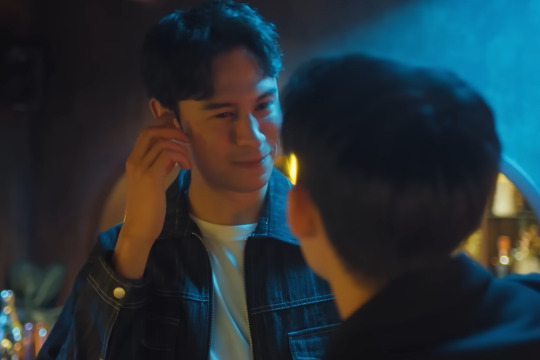

Because he looked at Pat greet Jeng in a knowing way, like he had been Pat. [episode 8]

Put stated that someone who is as famous as Jeng ISN'T ABLE to be out. This implies that Jeng must be closeted due to the level of his family's fame. [episode 8]
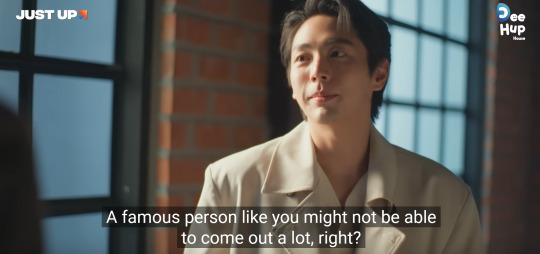
And Put and Jeng know each other from other business projects, so he is familiar with Jeng's celebrity status. [episode 2]
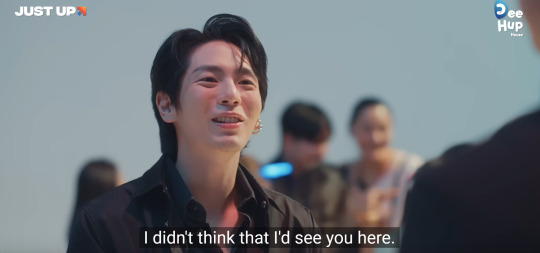
Tae telling Jeng to stop being afraid of what people will think. [episode 8]

Jaab was very upset that Jeng might have taken Pat out to eat. Some people thought it was because of what is happening to Jaab and Jen, and Jaab mentioned "it wasn't professional" but what if it's deeper than that since professional = family business? [episode 7]

When Pat looked up Jeng, all the articles were about how he is the rich, handsome, successful, and available heir to a massive conglomerate. [episode 4]

Which is something Put threw in Jeng's face when they were at the aquarium. Put told Jeng he was rich, handsome, talented, and born at the finish line, and it was reinforced at the dinner later on. [episode 5]

Pat found it suspicious that Jeng, the head of a digital marketing department, did not have social media. [episode 4]

And that wild coworker, stated that Jeng is mysterious when Chot said Jeng wasn't known for being a player.
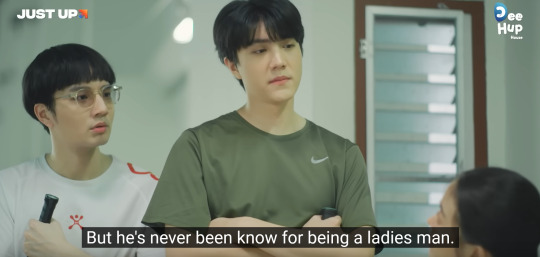
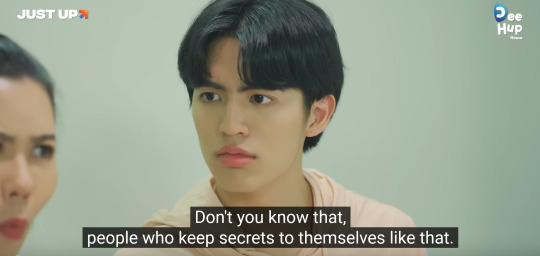


Does Jeng have to stay closeted?
This is how the dad looked at Pat when he emerged in Jeng's clothes after spending the night. The mom is looking at the dad because she knows he is displeased. [episode 3]

This is what Jeng said about his uncle. [episode 4]
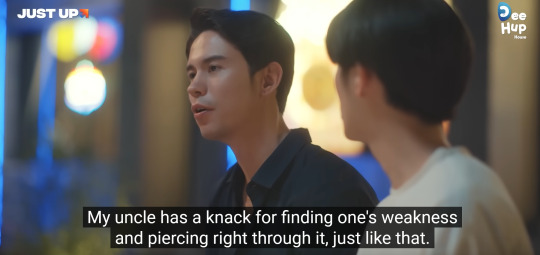
And remember this layered conversation Jeng had with his dad? The dad told Jeng he was needed to rebrand the company, but he was irritated about "things beyond his control." Jeng asked him what he was getting at, and he ended the conversation stating he was "still [Jeng's] dad" but it wasn't affectionate. [episode 5]

Jeng made several faces during that infamous meeting about BL actors, but the only statement he made was to draw up the contracts. [episode 5]

We are watching a BL, so everyone is gay until proven otherwise, but that was where we messed up. This show is still based in reality, and that meeting about BL actors showed us that. We messed up assuming Jeng was out-ish, but what if he isn't?
We have no idea what was the actual issue with his ex or if this ex was even a factor two years ago. We have no idea why Put and Pat broke up two years ago, and Pat fled to America where his dad is a chef.
But Pat's dad is visiting next week, and I'm praying we get some answers because Pat being shook that Jeng is gay has us all shook, and now I'm rethinking Jeng's character.
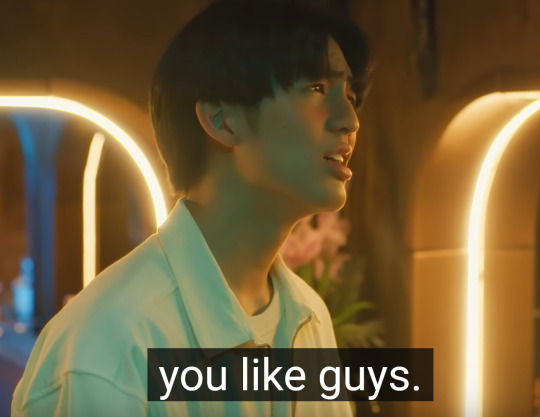
90 notes
·
View notes
Text
In 1966, William F. Buckley Jr., the founder of National Review, hosted Hugh Hefner, the founder of the wildly successful Playboy magazine, on Mr. Buckley’s weekly public affairs show, “Firing Line,” for a discussion of sexual ethics.
On the show, Mr. Buckley quoted Mr. Hefner as having argued that “man’s morality, like his religion, is a personal affair best left to his own conscience.” With Mr. Hefner dressed in a suit and Mr. Buckley sounding, as usual, like a parody of himself, Mr. Hefner described his view as “anti-puritanism, a response really to the puritan part of our culture.” Mr. Buckley did not like Mr. Hefner. Or, more accurately, he did not like his philosophy.
Mr. Buckley believed that “anti-puritanism” wasn’t just misinformed — he argued, both on the show and in print, that Mr. Hefner’s aim was to shatter the sexual values that he believed were conducive to what Mr. Buckley called a “viable existence.” On “Firing Line,” he sarcastically asked Mr. Hefner if he had “rewritten the ancient theological tablets.” If he had, “Oughtn’t you claim some sort of moral authority to do so, and if so, what is that moral authority?”
Hugh Hefner was a proud Democrat, but his brand of libertinism has jumped parties since that television interview. Sixty years later, in many ways, his view has won over the conservative movement that Mr. Buckley was so essential to. Trying to find a path that includes both defiant hedonism and the moralistic foundations of traditional, Buckleyesque conservatism has emerged as a central challenge of the movement.
Some conservatives seem to have decided that winning over a new constituency — one that hates rules and ordinances and loves hot people and cool ideas and sex, sex and ideally more sex — is worth changing what it means to be a conservative in the first place. Pursuing these voters is a perilous shift for conservatism, because the ethos relies not on a political ideology but on the lack of one: simply doing whatever one wants. A hornier conservative movement might be more electorally successful, but it will run headfirst into a wall of longstanding conservative policy commitments — to end abortion, eliminate pornography and reinforce the “nuclear family.” Goals that are, at the very least, not very horny.
Playboy magazine was marketed to men, and so is this particular brand of politics. Being a horny bro is not terribly unusual, or even bad. In fact, I’d argue that many men fall in this category — heterosexual men who think that liking sex and sexiness are generally good, uncomplicated things, and think that people who tell them that sex or sexiness is bad or sinful or problematic should be mocked or ignored. Some seemed to gravitate toward the ethos of Barstool Sports, the popular sports and betting media conglomerate.
The “Barstool conservative,” as Matthew Walther has argued, isn’t opposed to abortion; he’s opposed to political correctness. Mr. Walther wrote that Barstool conservatives are “people who, with varying degrees of enthusiasm, accept pornography, homosexuality, drug use, legalized gambling, and whatever Gamergate was about.” But what they do not accept, ever, is being told what to do, whether by “hectoring, schoolmarmish” politicians and media or by the federal government. This kind of conservative might not vote, or at least not vote on a consistent basis. But he does adhere to this specific, attitudinal type of politics. As my colleague Ross Douthat wrote in 2014, “This attitude is ‘liberal’ in that it regards sexual license as an unalloyed good, and treats any kind of social or religious conservatism as a dead letter. But at the same time it wants to rebel and lash out against the strictures it feels that feminism and political correctness have placed on male liberty, male rights.”
When the Supreme Court overturned Roe v. Wade last year, Barstool’s founder, Dave Portnoy, jumped on an “emergency press conference” on Twitter, saying: “It makes no sense how anybody thinks it’s their right to tell a woman what to do with her body. I just don’t get it. To take away the ability to make informed decisions on how they wanna live their lives is bananas.” Under the philosophical construct of horny bro-dom, the idea is that abortion isn’t good or bad, but it is an act that a woman wishes to commit, and nobody should tell anybody else what to do, or what not to do. In fact, in 1992, Bill Clinton (a noted horny bro) said something very much the same in a National Abortion Rights Action League survey: “The government simply has no right to interfere with decisions that must be made by women of America to make the right choice.”
Many conservatives disagreed with Mr. Portnoy on abortion (Mr. Portnoy declined my request for an interview). But they seemed to channel the “horny bro” perspective on a raft of other issues. While some conservatives want to ban pornography, others would welcome porn-film stars at right-wing conferences. In this, there’s been a subtle warping of the conservative movement as it sounds increasingly less like itself and more like its horny, libertine opposition, in the pursuit of electoral gains and cultural relevance.
The debate that Mr. Hefner and Mr. Buckley had about politics in the 1960s has become a defining question for the conservative movement: whether conservatism is a project intended to get people to do something (even things they do not wish to do) or to protect people from being told what to do.
There is a conservatism of ideology and the “three-legged stool” and there is a conservatism of “feels,” so to speak, a conservatism that doesn’t really care about tax credits or ethanol policy but has a distinct sense that there used to be something better than there is now and that what is to come is likely to be worse. But what if what used to be was something more libertine? What if some conservatives aren’t longing for Ronald Reagan’s heyday but for the time when women were hotter, you could put up a topless calendar in your cubicle at the office without fear of reprisal from some mean H.R. lady, and nobody told you what to do?
This has created peril for traditional Republicans. Attempting to come across as the “cool mom” of political persuasions — do whatever you want, just do it at home, and ideally, do it in a way that owns the teetotaling libs — is not the natural affect of movement conservatives.
And so some conservatives, unable or unwilling to adopt the type of horny-bro aesthetic that embraces sports, sex and generally letting “you do you” (provided you avoid making him do pretty much anything), have resorted to a paint-by-numbers anti-feminism. Conservative women are hot, The Federalist says! Single women are pathetic cat ladies, too ugly to love, say two actual members of Congress! It’s a strange interpretation of masculinity, as if learned from old issues of Maxim and a particularly bitter next-door neighbor. (Magdalene Taylor, who writes about sex and culture, told me she was reminded of a 2003 article in Maxim magazine titled “How to Cure a Feminist,” showing a step-by-step guide to make a masculine-presenting woman into a femme sex goddess, willing to wear tight tank tops and perform fellatio with abandon. This is how a swath of right-wing internet sounds pretty much all the time.)
Some conservatives have always attempted to hedge their bets: The same year that Mr. Buckley noted the availability of Penthouse magazine as a general indicator of increased “sexual permissiveness” that had caused a “rise in disease or death,” he also wrote a story for the publication (the piece was about the Rev. Jesse Jackson’s presidential candidacy and headlined ��Jesse Jackson’s Jive”). But there is no true way to bridge the divide between enforcing ideas and rejecting all enforcing.
I was thinking about this when I saw that the right-wing commentator Candace Owens had issued an awkwardly lukewarm defense of Andrew Tate, the kickboxer turned men’s-rights guru, who was recently accused of human trafficking offenses and rape in Romania. She argued that perhaps he was being railroaded by the media for his anti-feminist views. Perhaps he isn’t a rapist, she said, because “that is what people like to accuse men of when they’re trying to take them down, right?” She went on to say he was “up front” about his outlook on life and women, like a “modern Hugh Hefner.” It was a fascinating attempt at needle threading for a right-wing audience more disposed to an anti-feminist “horny bro” aesthetic than a defense of social conservatism: Sure, Mr. Tate might be bad if the allegations of human trafficking are true, but he’s not nearly as bad as the media for saying that doing so is wrong.
The life span of horny-bro conservatism is inherently limited by the very nature of what it means to be either a horny bro or a conservative — at a certain point, one viewpoint may overpower the other. But it seems as if attracting the horny bro to the Republican Party is increasingly more important than sating the conservative, particularly when it comes to getting voters. When the Bang Girls (of Bang Energy drinks) threw cash at conservative teenagers at a Turning Point USA youth conference in 2020, some elders argued that it was embarrassing and deplorable, far removed from “conservatism.” But one Twitter user responded to the Republican political strategist Alec Sears’s denunciation of the event, saying that perhaps the message was actually incredibly effective: “hot women and money. Being conservative will help you achieve those things. that’s what it has to do with it, that is the implication. Join us and get those things.” William F. Buckley would be horrified. Hugh Hefner would be proud.
23 notes
·
View notes
Note
One question about your Multiverse AU that I've always been dying to ask and have now gotten the courage to do so: How did the Geoff and Alejandro who got to become Vaquero meet and then subsequently fuse?
I'm also happy with just any tidbits about Vaquero because he seems like an incredibly interesting character.
Oh man that is one of my favorite stories !!! As always, pieced together with the help of @crystalfloe :)
So our multiverse has a pseudo-government, not necessarily in the collecting taxes sense, but in a very strict "detaining people with highly volatile personalities or magic powers" sense. So strict that you can be detained for something you did in a past life-- and you will be!
This is what happened to Geoff. Dude has no idea what he's in for, but one day he's shipped from a dinky little temporary holding cell into the massive, main DIDU complex (Dangerous Immortal Detention Unit).
He's supposed to go to some "rehab" program while he's here. A program that just so happens to be run by Alejandro!
Alejandro is a little more experienced when it comes to dealing with the multiverse; some might say too experienced. He's got a kind of terrifying powerset, and kind of hates his job as a therapist, but it pays well- and he really, really needs the cash.
See, Alejandro is a "pairhunter." Two immortals can "pair" with one another (almost always on accident) when their auras intertwine, giving them a powerful combined boost in magic. If this relationship is severed, however, the results can be unstable and catastrophic for the people who've paired. Oftentimes, without the support of their pair's original aura, their physical and mental forms break down until they're nothing but a conglomerate of goo wandering the multiversal plane, looking for their lost pair-- a creature known as a Pairhunter.
While it's unclear the circumstances that led to this Alejandro becoming one, we know his former pair was a Geoff-- probably an asshole, Aftermath-hosting one.
Pairhunters are almost always quarantined by the DIDU. Alejandro's employers don't know he is one, because he's found a temporary work around-- buying suspicious pills on the black market! Some lovely lady out there is extracting aura from a bunch of imprisoned Geoffs and condensing it into capsule form, which helps our little Al stave off total deterioration.
Geoff pills don't come cheap, though, which is why he has this job in the first place. Unfortunately, he leaves Geoff himself unattended in his office. More unfortunately, while rooting around for contraband (to bring back to the boys, bro!), Geoff finds and accidentally absorbs his medication.
Geoff has no reason to know it, but his power this lifetime is energy absorption. Pills made entirely of formless aura seep into your skin *quick,* especially if that aura is *yours.* He has no idea what just happened or even what those pills were.
What he *does* know is how panicked Alejandro is when he gets back. Total 180° from his usually suave, if disinterested, behavior-- talking about how he's going to lose his job and his mind. Geoff might be in jail, but that doesn't mean he's an asshole, so he does what you learn to do after a lifetime of prison; he grabs Alejandro and hides from the staff.
In a cramped little broom closet he sees something he hasn't before; a man breaking apart into abstract form, dripping onto the ground. Without the stabilization of those pills, Alejandro's basically done for. Confused and offput by this needlessly charming man in tears, Geoff does what a Geoff does best. He hugs the dude.
Turns out, when a being *made* of uncompressed energy and a being that *absorbs* uncompressed energy collide, they fuse.
Vaquero's first appearance is brief, but it changes the stakes. Even just those few seconds fused stabilized Alejandro better than a lifetime of pills. (Hugging your boyfriend is not a substitute for taking your antidepressants. This is fiction. go take your meds man). The two make a pact; Alejandro stops trying to mold Geoff into the ideal 'reformed prisoner,' and Geoff doesn't tell any guards what's happening. They continue their therapy sessions, of course, as scheduled, but those very quickly become nothing but the opportunity for Vaquero to form again.
And, naturally, over time they develop feelings for each other. Classic gay shit.
Unfortunately, every part of this plan is illegal, down to the act of fusion itself. Through a series of stupid mistakes and cocky attitudes, one guard (pseudoname Helix) develops his suspicions. Alejandro is pressured and interrogated. Worse, Geoff gets planned to move to deep solitary, with no hopes of ever seeing Alejandro again.
Who's ready for a good old fashioned prison break?
With Geoff's prison buds and Alejandro's knowledge of the complex, Vaquero manages to make it out into the central city-Hub of the multiverse. He loses Helix in a mostly condemned back alleyway, hiding in an abandoned building.
Once the lights come on, he realizes this place is perfect size for an illicit bar.
And so opens Club Vaquero, an underground and entirely secretive operation that hides the misfits and criminals of the wider multiverse. Run by a man you've never seen before, not at any Bridgette beach parties or Carlos soccer meets-- a man unlike anything you've seen in the multiverse before, a man with no parallel versions.
Let's just hope Helix doesn't hear about this place.
#my apologies for letting this sit a while before answering!!#i hope you like the read :)#multiverse au#total drama#geoff td#alejandro td#ask
26 notes
·
View notes
Text
"Given the complex relationship of Hizballah to its Lebanese constituencies—a relationship that traverses the Resistance, political, and social spheres—Israeli rhetoric stating that the purpose of this summer’s [2006] attack was to 'remove' Hizballah from Lebanon treads dangerously close to ideas of depopulation. Who is this Hizballah that the Israeli military so desperately wished to remove? What if one member of a family is a party member and others are not? What if the daughter of the family attends a school funded by Hizballah—does that make that family a legitimate target by Israeli reasoning? Or Fatima, a volunteer who cooks for the poor during Ramadan at a Hizballah welfare organization? Is she a target? Or Wafaa Hoteit, official party spokesperson and liaison to the press and researchers? What about the democratically elected Hizballah members of parliament? Mohammad Fneish, the minister of energy?
'Hizballah strongholds' are places where people live and work. The southern suburbs of Beirut, for example, are in fact a vibrant conglomeration of urban neighborhoods where residents have varying political perspectives, religious beliefs and identities, and lifestyles. Elaborate homes exist alongside run-down buildings, as do shops selling European fashions alongside those selling Islamic dress, all interspersed with internet cafés, vegetable stands, salons, charity organization offices, and corner markets. One of the buildings in the now entirely destroyed 'Hizballah security zone' contained the party’s media relations office, where reporters and researchers were granted interviews. That office was on the second floor of a block that included apartments, stores selling everything from spices to toys, and a fantastic bakery and juice bar—a far cry from the trappings of 'terrorist targets.' The deliberate targeting of civilian infrastructure and strikes on civilian convoys and residences indicate the Israeli government’s understanding that Hizballah is much more than an armed militia. And indeed, as we have seen, in addition to its Resistance militia, Hizballah is a political party and a social welfare network. It has to do with economic interests as well as religious ideologies, local politics, and anti-imperialist stances. This does not, however, legitimate the deliberate targeting of civilians. Israeli claims that Hizballah was 'hiding behind civilians' are efforts to counter the storm of accusations of deliberate targeting by reasserting the separation between people who were and were not carrying arms and placing the blame for the conflation on Hizballah. Yet both the AI and the HRW reports found that those claims did not hold up under investigation. To remove Hizballah from Lebanon would require the 'removal' of its civilian constituencies. Playing devil’s advocate, one could say that the enmeshment of Hizballah with civilian life in Lebanon legitimates strikes against civilian targets because the water is as hostile as the fish swimming in it. The obvious problem with this logic is that draining the pond would be tantamount to ethnic cleansing." Lara Deeb, “Hizballah and Its Civilian Constituencies in Lebanon,” in The War on Lebanon: A Reader, eds. Nubar Hovsepian and Rashid Khalidi (2007)
27 notes
·
View notes
Text
Gaby Del Valle at Politico Magazine:
The threat, we are told here this weekend, is existential, biological, epoch-defining. Economies will fail, civilizations will fall, and it will all happen because people aren’t having enough babies.
“The entire global financial system, the value of your money, and every asset you might buy with money is defined by leverage, which means its value depends on growth,” Kevin Dolan, a 37-year-old father of six from Virginia, tells the crowd that has gathered to hear him speak. “Every country in the developed world and most countries in the developing world face long-term population decline at a level that makes growth impossible to maintain,” Dolan says, “which means we are sitting on the bubble of all bubbles.” Despite this grim prognosis, the mood is optimistic. It’s early December, a few weeks before Christmas, and the hundred-odd people who have flocked to Austin for the first Natal Conference are here to come up with solutions. Though relatively small, as conferences go, NatalCon has attracted attendees who are almost intensely dedicated to the cause of raising the U.S. birth rate. The broader natalist movement has been gaining momentum lately in conservative circles — where anxieties over falling birth rates have converged with fears of rising immigration — and counts Elon Musk, who has nearly a dozen children, and Hungarian prime minister Viktor Orbán among its proponents. Natalism is often about more than raising birth rates, though that is certainly one of its aims; for many in the room, the ultimate goal is a total social overhaul, a culture in which child-rearing is paramount.
NatalCon’s emphasis on childbirth notwithstanding, there are very few women in the cavernous conference room of the LINE Hotel. The mostly male audience includes people of all ages, many of whom are childless themselves. Some of the women in attendance, however, have come to Austin with their children in tow — a visual representation of the desired outcome of this weekend. As if to emphasize the reason we’re all gathered here today, a baby babbles in the background while Dolan delivers his opening remarks.
Broadly speaking, the people who have paid as much as $1,000 to attend the conference are members of the New Right, a conglomeration of people in the populist wing of the conservative movement who believe we need seismic changes to the way we live now — and who often see the past as the best model for the future they’d like to build. Their ideology, such as it exists, is far from cohesive, and factions of the New Right are frequently in disagreement. But this weekend, these roughly aligned groups, from the libertarian-adjacent tech types to the Heritage Foundation staffers, along with some who likely have no connection with traditionally conservative or far-right causes at all, have found a unifying cause in natalism. At first glance, this conference might look like something new: A case for having kids that is rooted in a critique of the market-driven forces that shape our lives and the shifts that have made our culture less family-oriented. As Dolan later tells me in an email, declining birth rates are primarily the fault of “default middle-class ‘life path’ offered by our educational system and corporate employers,” which Dolan says is “in obvious competition with starting a family.” These systems, he believes, have created a consumer-driven, hedonistic society that requires its members to be slavishly devoted to their office jobs, often at the expense of starting a family.
But over the course of the conference, the seemingly novel arguments for having children fade and give way to a different set of concerns. Throughout the day, speakers and participants hint at the other aspects of modern life that worried them about future generations in the U.S. and other parts of the West: divorce, gender integration, “wokeness,” declining genetic “quality.” Many of the speakers and attendees see natalism as a way of reversing these changes. As the speakers chart their roadmaps for raising birth rates, it becomes evident that for the most dedicated of them, the mission is to build an army of like-minded people, starting with their own children, who will reject a whole host of changes wrought by liberal democracy and who, perhaps one day, will amount to a population large enough to effect more lasting change. This conference suggests there’s a simple way around the problem of majority rule: breeding a new majority — one that looks and sounds just like them.
In recent years, various factions of the old and the new right have coalesced around the idea that babies might be the cure for everything that’s wrong with society, in the United States and other parts of the developed West. It’s not a new argument. Natalists made similar claims in the early 20th century, when urbanization drove birth rates down and European immigration kept the U.S. population afloat. Then, too, people attributed the drop in fertility rates to endemic selfishness among young people.
Throughout it all, some religious conservative cultures have continued to see raising large broods as a divine mandate. White supremacists, meanwhile, have framed their project as a way of ensuring “a future for white children,” as declared by David Lane, a founding member of the white nationalist group The Order. More recently, natalist thinking has emerged among tech types interested in funding and using experimental reproductive technologies, and conservatives concerned about falling fertility rates and what they might mean for the future labor force of the United States and elsewhere in the developed world. The conservative think tanks the Center for Renewing America and the Heritage Foundation — the latter of which was represented at NatalCon — have proposed policies for a potential second Trump administration that would promote having children and raising them in nuclear families, including limiting access to contraceptives, banning no-fault divorce and ending policies that subsidize “single-motherhood.”
[...]
The speakers who lay out this bleak state of affairs are a motley crew of the extremely online right, many of whom go by their X (the website formerly called Twitter) handles rather than their names. Via Zoom, anonymous Twitter user Raw Egg Nationalist warns us about endocrine disruptors in everything from perfume to bottled water. Ben Braddock, an editor at the conservative magazine IM-1776, claims that antidepressants and birth control pills have permanent, detrimental effects on women’s fertility. Together, the speakers paint a dire picture of a society that has lost its way, abandoning fundamental biological truths and dooming itself to annihilation in the process. The solution, of course, is to have more babies. Peachy Keenan, a pseudonymous writer affiliated with the conservative Claremont Institute, urges attendees to “seize the means of reproduction” — as in, to out-breed liberals, who are already hobbling their movement by choosing to have just a couple children, or none at all. “We can use their visceral hatred of big families to our advantage,” Keenan says. “The other side is not reproducing; the anti-natalists are sterilizing themselves.”
Here lies the project, spelled out in detail: The people who disagree have bloodlines that are slowly going to die out. To speed up that process — to have this particular strain of conservative natalist ideology become dominant quickly in the United States — everyone in this room has to have more kids, and fast. But it’s only when the speakers get to who should have babies and how they should raise them that their deeper concerns, and the larger anxieties behind this conference, become clear. The goal, as put by Indian Bronson, the pseudonymous co-founder of the elite matchmaking service Keeper, is “more, better people.” But the speakers lack consensus on the meaning of the word “better,” as they do on the subject of using technology to encourage the best and brightest among us to breed.
Keenan, who has previously celebrated her sense that it is now acceptable to say “white genocide is real,” says better means conservative. Pat Fagan, the director of the Marriage and Religion Institute at the Catholic University of America, says good children are the product of stable, two-parent Christian households, away from the corrupting influences of public school and sex ed. (Christian couples, he adds, have “the best, most orgasmic sex,” citing no research or surveys to support this.) To protect these households, we must abolish no-fault divorce, declares Brit Benjamin, a lawyer with waist-length curly red hair. (Until relatively recently, Benjamin was married to Patri Friedman — grandson of economist Milton Friedman — the founder of the Seasteading Institute, a Peter Thiel-backed effort to build new libertarian enclaves at sea.) And to ensure that these children grow up to be adults who understand their proper place in both the family and the larger social order, we need to oust women from the workforce and reinstitute male-only spaces “where women are disadvantaged as a result,” shampoo magnate and aspiring warlord Charles Haywood says, prompting cheers from the men in the audience.
The far-right natalist movement's goals are to cause a population explosion of people who think like them.
#Natalism#Abortion#Anti Abortion Extremism#Sexism#Natal Conference#Charles Haywood#Kevin Dolan#Elon Musk#Viktor Orbán#Project 2025#The Heritage Foundation#Peachy Keenan
16 notes
·
View notes
Text
I've been dwelling on this idea for an anthology of life on multiple "degenerated" imperial-capitalist interstellar colonies, inspired by a few sources. A broad breakdown of the history:
• Future humanity "develops" the inner solar system by surveying the Moon and asteroids to develop a rationalized system of extra-planetary "rents" and asset exchange, i.e., trading licenses to unproductive rocks as if they were stocks.
• Surveyors encounter an ancient gateway part of an ancient, space-folding network of connections to other exoplanets throughout our galaxy, quite a few being habitable.
• The discovery leads to an alliance of great powers monopolizing the Sol gateway to regulate exploration of the great beyond.
• A massive rush begins to survey and engineer new markets upon the virgin worlds.
• Many of these nascent world-markets boil down to pet projects of industrial and land conglomerates, NGOs like academic organizations and bourgeois charities, governmental agencies, and other less 'notable' influential groups.
• Many worlds are settled only gradually and piecemeal as over-glorified credit traps and enrichment schemes for various interest groups of bourgeois society—from global real estate ventures to utopian community-building projects.
• Decades pass, and the diffusion of capital across the webway of worlds has over-specialized whole planets in this pattern.
• For example, a world that a banking network has very sparsely peopled with a class of debt-captive labor, or land speculators have so monopolized that it's dotted only by clusters of prefab office towers, or that some industrial group has planted a dozen mines or workshops fringed by some shanty towns.
• Very rarely are these colonies actually materially productive.
• Then, suddenly, for no explicable reason, the gateway network crashes—stranding hundreds of human colonies from each other across the cosmos.
• On most of these worlds proceed to collapse and follow insular patterns of recovery that lead to barbaric world orders.
4 notes
·
View notes
Note
( pass over the mic yap session about society !! )
"Patriarchy is the reason for social inequality."
While the patriarchy might still have a few creases of truth left, the real engine behind societal inequality isn't a bunch of men in charge—it's a lot more shady and, let's face it, boring: it's the oligarchy.
When we talk about the "patriarchy," we tend to imagine a monolithic group of misogynistic, power-hungry men in suits. Men as a class—straight, cis, white, etc—dominate all sectors, and that's it. But power doesn't work that way. Sure, there are wealthy men who dominate certain spaces—politics, business, tech—but these men aren't the representative of all men, nor are they acting in the interest of all men. They are acting in the interest of the ultra-wealthy, the ones who sit at the very tip-top of society's pyramid, and those are not just men. In fact, if you look closely at the historical and contemporary case studies of power structures, you'll notice something incredibly telling: power, in its most concentrated form, is an affair of the ultra-wealthy, not necessarily an affair of gender. Enter the oligarchy, which is a much more fitting lens for the problem. Case Study 1: The Koch Brothers Take the Koch Brothers, Charles and David (until the latter's death in 2019), for instance. These men didn't just "rule" the world because they were men. They ruled because they controlled one of the largest privately-owned conglomerate in the world, Koch Industries, a company with tentacles in everything from oil to chemicals to paper products. The wealth they racked up let them pull strings in politics and policy in ways that made even the most experienced political operatives look like amateurs. If the Kochs were "patriarchal" in the traditional sense, they would have focused exclusively on men—on their male-dominated industries, on their male-dominated networks. Yet, while they funded an impressive army of conservative men in politics (Mitch McConnell, anyone?), they didn't stop there. They worked with women like Elisabeth Koch, who ran Koch Industries' charitable foundation, and even had business partnerships with women in powerful circles. This wasn't a "patriarchy" running amok—it was a network of the ultra-wealthy. Now, take a look at Silicon Valley, where the oligarchic nature of power is even more evident. Sure, Mark Zuckerberg is a male figurehead, but the power dynamics in Silicon Valley aren’t driven by “patriarchal” social norms; they’re driven by capital accumulation and networking. Consider Sheryl Sandberg of Facebook—she’s the one who helped Zuckerberg steer the ship toward global dominance. Women have a seat at the table in these worlds, but they’re not there because of some rosy idea of gender equality—they’re there because they’ve helped build the wealth and power structures of tech. Zuckerberg, Sandberg, Elon Musk, and Jeff Bezos are all billionaires, but their real power isn't in any antiquated “patriarchal” system; it's in the economic oligarchy they’ve built by cornering the global digital and industrial markets. It’s not just about being a man—it’s about who holds the financial leverage. So, Where Does Patriarchy Fit In? While there’s definitely a gendered element to many power structures, particularly in traditional or conservative sectors (think: government, military, religious institutions), focusing on patriarchy as the only villain is a bit like blaming the smoke for the fire. Yes, patriarchal attitudes persist in these spaces, but what enables them to persist is the wealth and resources behind them. It’s not just that “men” are in charge—it’s that wealthy men (and women) control the mechanisms by which these institutions remain powerful.
Example: The Wage Gap and Gendered Work
The gender pay gap is real, and the systemic nature of it is undeniable. But the gap exists not because men are inherently paid more (though they are), but because the industries where women are overrepresented—like education, healthcare, and social services—are some of the least profitable and least powerful. Capital is the determining factor in this imbalance. If women ran multinational corporations or controlled the wealth of an empire like Jeff Bezos, we’d see a very different economic landscape.
In short, the “patriarchy” is often just a useful stand-in for the larger, more insidious system of wealth accumulation that keeps everyone in line—regardless of gender. The Oligarchy's Grand Blueprint: The System isn't Broken; It's Rigged The oligarchic system is designed to keep the power in the hands of a few, regardless of gender, race, or any other factor. Whether it's men or women at the top, the result is the same: an elite group controls the resources, the policies, and, ultimately, the lives of the rest of us. This isn’t about gender discrimination at its heart—it’s about class and economic power. The Great Oligarchy of Today
Think of your average billionaire—whether Elon Musk, Jeff Bezos, or Warren Buffet—and you realize they aren’t running the show because of some gendered “patriarchy” thing. They’re running the show because they own everything. From real estate to tech to media outlets, they have investments in nearly every sector imaginable. Musk isn’t just controlling a space company; he’s controlling public discourse, through his influence on social media, on climate policy, and even on the future of transportation.
These figures don’t care much for the “patriarchy”; they care about maintaining an oligarchic system that protects their power. It’s class, baby. It’s always been class.
My Final Conclusion: The Patriarchy Is a Camouflaged Oligarchy
The real power dynamics are much more complex and, dare I say, far more boring. The issue is less about men vs. women and more about wealthy people vs. the rest of us. It’s about a global oligarchy where a few select individuals and families hold all the cards. They don’t just sit at the table; they own the table, the chairs, and the building it’s in. Gender is an incidental thing in the much larger structure of capitalism, where the rich are the ones with the most power—patriarchal or not.
In conclusion: the patriarchy is alive and well, but it’s not exactly the cause of our woes. It’s the oligarchy—where the 1% (and often the .0001%) run the show, gender be damned. It’s about class, wealth, and who owns the whole thing—and that is a much bigger problem than anything a few men could ever engineer alone.
Alright, first off, let’s not pretend the patriarchy doesn’t exist—it does. But here’s the thing: it’s not just a patriarchy; it’s a patriarchy built on class. And the ones at the top? They don’t give a rat’s ass about you, me, or even the fact they’re men. Power doesn’t have a gender—it has a price tag. Look at Musk, Bezos, Zuckerberg—all those guys aren’t at the top because they have dicks. They’re there because they own everything that matters. They don’t need to be part of some “monolithic men’s club” because they’ve got their own private jet club where the real decisions get made.
Now, I’ll give you this: the patriarchy’s a convenient scapegoat. It lets people sit around blaming men as a class while the ultra-wealthy—yes, some of them women—keep rigging the system behind closed doors. Think Sheryl Sandberg or the Walton sisters; they didn’t break the glass ceiling to help women—they did it to climb higher on the pile of money and power. The Koch brothers, Zuckerberg, Sandberg, Musk… they all play the same game, and it’s not gendered. It’s about staying on top while the rest of us drown. The real system at work isn’t about who has a Y chromosome; it’s about who’s got the fattest bank account.
But here’s where I’ll stop you: while the oligarchy is the main engine, you’re lying to yourself if you think the patriarchy doesn’t grease the wheels. You’re telling me a woman born into the same working-class shithole as a man has the same shot? Please. The whole machine runs smoother because of those old-school rules that keep women and minorities just enough in their place to ensure the right kind of competition stays at the top.
So yeah, class is king. But don’t fool yourself into thinking gender doesn’t matter. The patriarchy and the oligarchy aren’t separate—they’re dance partners. And if you want to take them down, you better be ready to cut off both heads of the beast.
3 notes
·
View notes
Text
Is Moana Capitalist Propaganda?

With Moana 2 coming out in a few days (rumour has it she might literally be coming out), I thought it might be nice to cast our minds back to the first one (first released 8 years ago now…) and consider whether the film itself is a subtle vehicle for capitalist propaganda.
Disney has been historically critiqued as a multinational conglomerate who's sole purpose is to create childish animations mass-produced for private profits.
Moana was revolutionary, not only did it celebrate Polythesian culture, but Moana was also the first Disney princess to have a normal body shape, rather than the typical pinched waist of most Disney characters. This was an enormous breakthrough as Disney's princesses and increased Disney's visibility and consumer base.
However, Disney seems to be monopolizing on the stories of Polythesian culture for personal gain. Their artistic representations have been appropriated to attract audiences and increase merchandise sales, and Disney is the largest merchandise vendor in the world.
Moana's journey prioritises individual agency and self reliance, she is constantly berated by those around her for attempting to leave the island and even suppose that there is another, better world out there, but she choses instead to restore her island to its former glory, in line with the capitalist beliefs that one's personal efforts can drive societal change.
Maui also holds seemingly capitalist principles, his achievements are what makes up his self worth. Maui's rediscovery of his purpose through earning back his magical fishhook, emphasise that personal accomplishment are central to his identity. This aligns with the capitalist ideals that value is derived from one's personal contributions and success, rather than the success of a community.
Tamatoa, the coconut crab most famous for Jemaine Clement's Shiny, exemplifies consumerism and the desire for the biggest and shiniest treasures out there, similar to how corporations thrive off advertising and marketing 'must-have' products. His character aligns with how corporations such as Disney, emphasise exclusivity and luxury: the allure of possessing the very best.
Moana's community thrives on collectivisation and collaboration, key communist ideals, yet Disney's portrayal of them shattering as soon as Te Ka, the film's main antagonist, has had her heart stolen, implies that if power is in the wrong hands, a seemingly harmonious world can crumble. This draws on the idea of how many communist ideas seem perfect in theory yet are unable to be executed due to mankind's desire for power. Te Ka's rediscovery of her old self, Te Fiti, who previously embraced freedom and discovery, links to Jean-Paul Sartre's idea that we are 'radically free' and to deny our radical freedom is bad faith.
This can also be seen in the portrayal of Moana's father, who in his youth also longed for a similar freedom yet after the death of his friend, developed aquaphobia and forbade his people from venturing beyond the reef. Although freedom may be messy, humans value their right of choice, even though it comes with certain responsibility.
We can also link this to Sartre's ideas of existence over essence, since we have no creator, humans are not born with a predetermined purpose; instead, they must create their own meaning. Moana's internal struggle—torn between staying on the island to fulfil her expected role and venturing into the unknown to forge her own destiny—mirrors this existential dilemma. Ultimately, she chooses to forge her own path which suggests that she wants to be more than just one of the many (emphasised in the scene where her father shows her the rocks of the fathers before him), she wants to break free and become her own self.
It is only through Moana's independence and self determination that the heart can be restored and the community, and individual action is emphasised as the catalyst for communal success which endorses capitalist values over collective problem solving. Her community also remains passive throughout her journey, once more amplifying the independent voice as a means of restoration.
At the end of the film the people of Montunui embrace Moana's independence and start a life of their own, yet this could also draw on themes of human's exploitation of the natural environment as they begin to cultivate more and more of the earth's resources.
4 notes
·
View notes